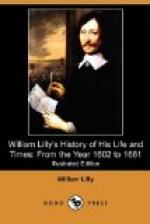I had only twenty shillings, and no more, to buy me a new suit, hose, doublet, &c. my doublet was fustian: I repaired to Mr. Smatty, when I was accoutred, for a letter to my master, which he gave me.
Upon Monday, April 3, 1620, I departed from Diseworth, and came to Leicester: but I must acquaint you, that before I came away I visited my friends, amongst whom I had given me about ten shillings, which was a great comfort unto me. On Tuesday, April the 4th, I took leave of my father, then in Leicester gaol for debt, and came along with Bradshaw the carrier, the same person with whom many of the Duke of Buckingham’s kindred had come up with. Hark how the waggons crack with their rich lading! It was a very stormy week, cold and uncomfortable: I footed it all along; we could not reach London until Palm-Sunday, the 9th of April, about half an hour after three in the afternoon, at which time we entered Smithfield. When I had gratified the carrier and his servants, I had seven shillings and sixpence left, and no more; one suit of cloaths upon my back, two shirts, three bands, one pair of shoes, and as many stockings. Upon the delivery of my letter my master entertained me, and next day bought me a new cloak, of which you may imagine (good Esquire) whether I was not proud of; besides, I saw and eat good white bread, contrary to our diet in Leicestershire. My master’s name was Gilbert Wright, born at Market Bosworth in Leicestershire; my mistress was born at Ashby de la Zouch, in the same county, and in the town where I had gone to school. This Gilbert Wright could neither write nor read: he lived upon his annual rents, was of no calling or profession; he had for many years been servant to the Lady Pawlet in Hertfordshire; and when Serjeant Puckering was made Lord keeper, he made him keeper of his lodgings at Whitehall. When Sir Thomas Egerton was made Lord Chancellor, he entertained him in the same place; and when he married a widow in Newgate Market, the Lord Chancellor recommended him to the company of Salters, London, to admit him into their company, and so they did, and my master in 1624, was master of that company; he was a man of excellent natural parts, and would speak publickly upon any occasion very rationally and to the purpose. I write this, that the world may know he was no taylor, or myself of that or any other calling or profession: my work was to go before my master to church; to attend my master when he went abroad; to make clean his shoes; sweep the street; help to drive bucks when he washed; fetch water in a tub from the Thames: I have helped to carry eighteen tubs of water in one morning; weed the garden; all manner of drudgeries I willingly performed; scrape trenchers, &c. If I had any profession, it was of this nature: I should never have denied being a taylor, had I been one; for there is no calling so base, which by God’s mercy may not afford a livelihood; and had not my master entertained me, I would have been of a very mean profession ere I would have returned into the country again; so here ends the actions of eighteen years of my life.




